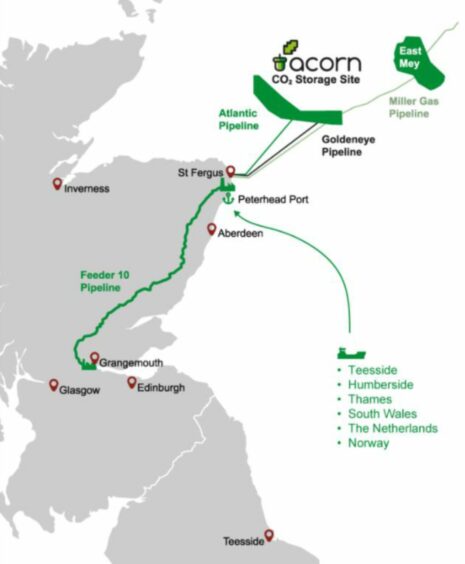
The developers of the Acorn project say they hope the scheme can be online by 2027 but are wary of further delays to government support packages, as ministers met this week to discuss decarbonisation efforts.
Questioned by MPs on Monday a representative for Storegga, one of the firms behind the project, said its goal of generating first hydrogen by 2027 “doesn’t allow much time for further delays,” as the scheme awaits further news on essential government funding.
Linking carbon capture and storage (CCS) and hydrogen schemes in the northeast, Acorn is a key component of the Scottish Cluster, a major infrastructure bid backed by the likes of Shell, ETZ Ltd, Wood, Storegga and Ineos.
The project was passed over for so-called “Track 1” CCS funding last year, in favour of rival bids from the East Coast Cluster and HyNet, which are now aimed at being operational by the middle of this decade.
Acorn – currently on the “reserve” list – is believed to be a top choice for the upcoming “Track 2” process, but key backers are concerned that any delays will set the sector back considerably.
The comments were made during a Scottish Affairs Committee evidence-gathering session held on Monday, in which experts including SSE, Scottish Power, Storegga and the Royal Society of Edinburgh offered insight into the state of the Scottish hydrogen sector.
Responding to a question from Aberdeen Conservative MP Andrew Bowie as to what the decision meant for the project, Storegga hydrogen commercial specialist, Sarah Potts said the Acorn backers were “very disappointed” not secure Track 1 status and that “being a reserve cluster meant a significant amount of timing uncertainty in terms of how the project progresses.”
“Uncertainty is never good for investment decisions when you’re talking about significant amounts of investment.”
However, she reaffirmed that the developers were “very keen to progress.”
“We’re very ambitious in terms of the time frame that we’d like to kind of be on stream by, and therefore we are moving ahead with our plans across all of the different modules,” she continued.
Questioned as to the demand for hydrogen in Scotland, Ms Potts said Acorn had received over 800MW worth of interest from potential end users and customers in the region ahead of its Track 1 bid.
While the project is still hopeful of securing further funding via the future Track 1 reserve and Track 2 processes, she said the developer was “nervous” about the Track 2 timeline and the potential for further delays.
“We are very supportive of the government ambition to get after developing CCS clusters and bring them on stream in 2030 and we’re very much aligned with that ambition, although we would clearly like it to be going faster,” she added.
“We are still hopeful that with even with Track 2, we can still deliver first hydrogen in 2027. It is a tight timeline and it really doesn’t allow us allow much time for further delays.”
Monday’s session was followed up by a separate roundtable on Tuesday hosted by MP for Banff and Buchan, David Duguid, and attended by the heads of Storegga, SSE Thermal and INEOS FPS, as well as minister of state for energy Greg Hands and Norwegian and German representatives.
This session pressed the value of the North Sea as a carbon storage resource, and its ability to support wider industrial decarbonisation.
Mr Hands voiced his support for the Scottish Cluster in particular, noting: “We are committed to making the UK a world-leader in carbon capture, and it was great to meet with industry today to discuss how we can work together to make this happen.
“This will be vital to reducing emissions, along with increasing our reliance on clean, homegrown power, and we are determined to further develop this promising sector, to bring in investment into the UK, and support new jobs across the country.”
Mr Hands told Energy Voice in April that the government intended to provide an update on the Track 2 process later this year.
During the roundtable, SNP MP Stephen Flynn also offered to develop a cross-party letter of support for the Acorn Project that will be sent to the Treasury to make the case for “enhanced pace of delivery” for the Acorn Project, through a relaxation of permits and regulations.
 © Supplied by Acorn
© Supplied by Acorn